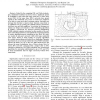Free Online Productivity Tools
i2Speak
i2Symbol
i2OCR
iTex2Img
iWeb2Print
iWeb2Shot
i2Type
iPdf2Split
iPdf2Merge
i2Bopomofo
i2Arabic
i2Style
i2Image
i2PDF
iLatex2Rtf
Sci2ools
INFOCOM
2006
IEEE
2006
IEEE
Flow Scheduling for End-Host Multihoming
Abstract— Fueled by the competing DSL and Cable technologies, residential broadband access has seen a significant spread in availability to the point that many users have a choice from several ISPs. At the same time, 802.11 networks have spread rapidly in the residential area, and it is common for neighbors to be able to access each other’s wireless routers. End-users can leverage this diversity to improve their Internet connectivity at no additional cost by pooling all available Internet connections, both their own and their neighbors’ via wireless. In this paper we present our design and evaluation of flow scheduling algorithms in PERM, a framework for practical end-host multihoming. PERM scheduler employs automated on-line analysis of the endusers’ networking behaviors, and exploits the recognized patterns to achieve high-performance scheduling at flow level. We verify our models of end-user’s network traffic with large residential TCP traces. Based on these models we ...
| Added | 11 Jun 2010 |
| Updated | 11 Jun 2010 |
| Type | Conference |
| Year | 2006 |
| Where | INFOCOM |
| Authors | Nathanael Thompson, Guanghui He, Haiyun Luo |
Comments (0)

